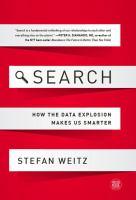
As a director of Search at Microsoft, Stefan Weitz, in his book Search, focuses on the future of predictive search that cuts out the human action necessary to utilize current search options and applications. Now, one can search for services, but the user has to take action in order to obtain them. In the future, Weitz posits that the system will know the user well enough to cut out this middle step. Through the capable web, people will be able to “take action, not just find information” (pg. 8).
Weitz refers to search as a “hinge” between the abilities of humans and machines, bridging the two. The search of the future will be able to infer context, cater to the individual searcher, take the action he or she needs, and provide the most relevant information based on the person’s history, location, and device used. We have items that can track grocery levels, energy consumption, and shopping habits, which can be useful, but where does that end? While reading, I thought of the ads I often see online, especially when I have recently shopped for a particular item. And, as Weitz points out, there are privacy issues. While it may be nice to have a device that predicts your preferences, it is a little eerie. What happens if the system is wrong, and it takes an action the user does not want?
There are many advantages to the predictive search, and Weitz offers a couple in chapter three. It would alert a user if he needs to leave early because of heavier than usual traffic, as well as bringing up news stories that may be relevant to that particular user’s financial future.
Weitz predicts that improved search will allow humans to be happier, because we will be able to “offload” information from our brains to devices, and never forget anything again. This will reduce stress about remembering what we wanted to ask someone the next time we see them, where we left off on a movie we were watching or book we were reading on a different device, or even what we need to buy when we are out.
Possible drawbacks of this hyper-personalized search, as described in Eli Pariser’s book The Filter Bubble, include users only being exposed to information they already want to see. This will restrict the information available to them, reinforcing ideas and viewpoints while eliminating the opportunity to learn about differing views.
